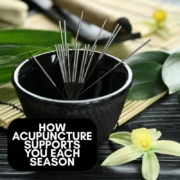Chronic Pain: Integrative Strategies for Relief
Finding relief from chronic pain may feel like a never-ending, uphill battle. Maybe you’ve been prescribed a medication or you’ve tried some type of therapy to address your most debilitating symptoms only for your pain to eventually return. Or, maybe you’ve gotten to the point of accepting life with it. Many people can’t even fathom attempting to get rid of it because it’s physically and emotionally exhausting to try. Indeed, your chronic pain may never fully go away, but if you are living with chronic pain you must understand the following:
- Chronic pain will generally get worse over time and the longer it is neglected the more complex the healing process can be. If you have chronic pain, that means you have been living with a condition for months at minimum, and more likely for years. You may not feel ready now, but the longer you wait to address your condition, the longer the treatment process can be.
- Chronic pain is not just physical discomfort, it is intricately tied to our emotional well-being. It is estimated that 60% of patients who have chronic pain, also have depression and this relationship is bidirectional (meaning that depression can cause pain and vice versa). Research also confirms that the more severe your pain is, the more severe your depression becomes, with the reverse also being true. The longer you live with chronic pain the higher your risk of developing anxiety or depression.
- Chronic pain is a symptom of inflammation. Inflammation can stem from any number of conditions that are taxing to the body such as an illness or disorder, an injury, infection, toxicity, or nutritional deficiencies, and can be cumulative in their inflammatory effect. Heightened inflammation can affect the nervous system and undermine the function of your immune system exacerbating both physical and emotional pain. Without addressing the underlying source(s) of inflammation, your chronic pain will not get better or go away. Once the inflammation is addressed, the severity and frequency of symptoms can improve, sometimes drastically and sometimes completely.
How We Can Help
Seeking guidance from healthcare professionals who specialize in treating chronic pain is key.
You want a pain specialist who will
1) uncover ALL of the reasons why your body is inflamed and in pain; and
2) offer you a comprehensive and multifaceted treatment so your healing is as complete as it can be.
This functional medicine approach is centered on improving the function of your body as a whole. This may not mean living completely pain-free, it means getting back your energy to reengage in life and feel good both mentally and physically.
Our team is made up of physicians, nurses, PTs, a nutritionist, a psychotherapist, and an acupuncturist so that the most appropriate treatment for you is available under one roof. We will take time to explore the onset of your pain, the specific nature of your symptoms, and the overall status of your health. Once accurately diagnosed we’ll work with you to come up with targeted solutions that suit your lifestyle and your preferences.
Our Integrative Treatments
Integrative medicine combines the best of conventional and alternative treatments to get the outcome you need to live with less pain and an improved quality of life. Your chronic pain could be treated by one or a combination of the following,
- Manual Therapies (osteopathic manipulative medicine, physical therapy)
Osteopathic techniques restore function to an unbalanced and restricted musculoskeletal system. Gentle stretching and manipulation can improve the mobility of your muscles, soft tissues, and joints, for an improved range of motion. In the same vein, physical therapy will employ exercises to restore function to a particular area. When manual therapy is recommended, you and your provider will discuss which type is most appropriate for your condition. - Injection Therapies (prolotherapy, platelet-rich plasma/PRP, perineural injections/PIT, trigger point injections, steroid injections)
Depending on the nature and location of your pain, injection therapy may be recommended. While all injection therapies deliver some type of solution to a targeted area, some are used to treat musculoskeletal injuries, and others are used for treating neuropathic pain. - Nutrition and Lifestyle Modifications
Eating a balanced diet and maintaining a healthy lifestyle can play a significant role in managing chronic pain. Certain foods and beverages, such as inflammatory foods, caffeine, and alcohol, may exacerbate pain symptoms, while others, such as anti-inflammatory foods, antioxidants, and vitamins, can help reduce inflammation and promote healing. If inflammation in the gut or food sensitivities are identified, it’s even more crucial to make changes to your nutrition right away to control the inflammation they may be causing. - Detoxification Therapy
When toxins accumulate in the body over a long period, it can cause damage to your tissues and organs and a toxicity disorder can develop. Unidentified pain can sometimes be caused by such disorders. If toxicity is suspected and confirmed via testing, medications may be prescribed to bind to and eliminate the harmful toxins from your body. - Acupuncture, Biofeedback, Cognitive Behavioral Therapy
Therapies based on the connection between the mind and body can greatly influence our physical health and emotional well-being. Practices such as acupuncture, biofeedback, and cognitive-behavioral therapy can help individuals with chronic pain learn to manage their symptoms more effectively.
♦ Acupuncture – involves inserting thin needles into specific points on the body to stimulate energy flow and promote healing
♦ Biofeedback – teaches individuals to control physiological responses such as heart rate and muscle tension through relaxation techniques
♦ Cognitive-behavioral therapy – helps identify and modify negative thought patterns and behaviors that contribute to chronic pain - Stress Management and Relaxation Techniques
Chronic pain and stress often go hand in hand, creating a vicious cycle that exacerbates discomfort. Learning to manage stress and incorporate relaxation techniques into your daily routine can help lower inflammation (this is proven!) and reduce your perception of pain. Techniques such as deep breathing exercises, progressive muscle relaxation, guided imagery, and mindfulness meditation can promote relaxation, reduce muscle tension, and alleviate pain. Engaging in activities that bring you joy and foster a sense of well-being, such as spending time with loved ones, pursuing hobbies, or connecting with nature, can also help to distract you from pain and improve your overall outlook on life. - Exercise and Movement
Physical activity is crucial for managing chronic pain since it helps strengthen muscles, improve flexibility, and release endorphins, your body’s natural painkillers. While it’s essential to choose activities that are gentle on your body and appropriate for your condition, incorporating regular exercise into your routine can have significant benefits. This may include activities such as walking, swimming, yoga, or tai chi, which promote relaxation, reduce stress, and enhance overall physical function. Start slowly, listen to your body, and gradually increase the intensity and duration of your workouts as tolerated.
The complexities of chronic pain are not just in its causes but in its effects. It can lead to decreased mobility, a constant state of alertness, and emotional distress. We can help you. We understand that your chronic pain is as unique as you are. We also understand that how and when you choose to address your pain is no small decision. Our team is ready to support you every step of the way.
If you have been experiencing chronic pain and need help managing the condition, be sure to speak to one of our experienced nurses today. Please give us a call at 703-532-4892.











Leave a Reply
Want to join the discussion?Feel free to contribute!